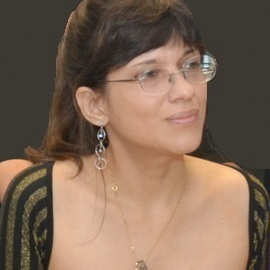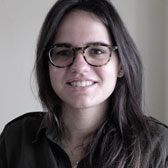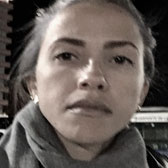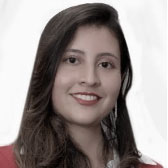IT Women Mentoring
Which are the objectives of the program?
The IT Women Mentoring Program seeks to promote the participation and leadership of women in the LACNIC community and the Internet ecosystem.
The program promotes the professional development of women in the Internet technical community in Latin America and the Caribbean, favoring their involvement in LACNIC participation spaces.
Through an open call, the program selects advanced students or female professionals in the initial stages of professional career in Technology such as: Telecommunications Engineering, Computing, Computer Science or related ones, with interest in LACNIC's lines and axes of work (see research/work lines and topics).
What does the program consist of?
When submitting their application, candidates must include their background, motivation, and their main lines and topics of interest (see research/work lines and topics), together with a brief idea of ??a potential challenge or problem to be addressed related to them.
Those selected candidates have the opportunity to work with a mentor (leader of the technical community) in the detection, conceptualization, and development of possible proposals on the selected topic.
The work is captured in a research poster that can be presented at the LACNIC event in October.
In addition, the candidates who produce the best-evaluated works are able to attend the event in person and receive a participation scholarship (covering travel from their place of residence, accommodation, travel expenses, and medical insurance).
Additionally, they will have access to the following benefits for a period of 6 months:
- Access to training on technical topics, soft skills, and cross-cutting content on leadership, communication and project presentation, emerging technologies, among others.
- Free access to online courses offered on the LACNIC Campus.
- Training sessions on LACNIC's objectives, functions, and support opportunities.
What are the terms and conditions of the program?
Selected candidates must sign a letter of acceptance of the terms and conditions prior to the start of the program.
During the 6-month duration, at least 4 meetings with the mentor and LACNIC staff are expected, as well as at least 1 training session per month. In addition, a presentation of the interim results is scheduled three months after the start of the program.
The opportunity to present the results in research poster format at the LACNIC event in October, will be subject to evaluation by the staff in charge of the program together with the mentor designated for each candidate.
In addition, the candidates who produce the best-evaluated works will be able to attend the event in person and receive a participation scholarship (covering travel from their place of residence, accommodation, travel expenses, and medical insurance).
Other benefits
At the end of the 6-month program, candidates receive an intermediate certificate (program completion). If they meet the stipulated conditions and remain involved in the LACNIC community and activities during the 6 months following its completion, they also receive a final certificate with the training hours.
Who can apply?
Advanced students or female professionals in the initial stages of their professions in Technology careers such as: Telecommunications Engineering, Computing, Computer Science or related careers, with an interest in LACNIC's lines and areas of work(see research/work lines and topics), can apply.
Applicants must be based and carry out their activities in Latin America and the Caribbean, specifically in territories that are part of LACNIC's coverage area.
Selected candidates must be available to complete the mentoring process and the proposed activities within the established 6 months of collaboration.
What are the lines and topics of interest?
The work to be carried out with the mentor must be aligned with the detection, conceptualization and development of possible proposals on the selected topic, in one of the lines of research/work of interest to LACNIC and one of the associated topics (see research/work lines and topics).
How does the application and selection process work?
All applications must be completed using an online form that includes information about the candidate's training and/or experience, her motivation for participating in the program and a brief idea (maximum 500 words) about the selected line and topic. The applications received are evaluated by the program selection committee, composed of experts of LACNIC.
The selection criteria are:
(a) the applicant's educational background and/or experience;
(b) motivation;
(c) the proposed idea (relevance, pertinence and potential of impact/results for the technical community).
Who are assigned as mentors?
Mentors are assigned according to the candidates' profiles as well as the candidate's line and topic of work.
Further information
The Mentoring Program was implemented from 2020 through 2025, inclusive. Below, you may find additional information on the candidates selected in these editions, as well as the work carried out during the program.
Bibiana Ivett George Juarez, Mexico
Mentor: Dra. Cristina Mayr
Ivett is a telematics Engineer at the National Polytechnic Institute (IPN-UPIITA). She currently leads the AWS Club Tlaxcala, promoting the learning and adoption of cloud technologies in her community. She has experience in software development, cloud infrastructure, and systems automation, with a special interest in network optimization and monitoring.
Furthermore, she collaborated on the research for her undergraduate project, where she developed a mathematical model to measure energy consumption in sensor network monitoring with Machine Learning.
During the Program, she will work on the project “Optimization and automation of network monitoring using BGP-based predictive analytics”, aiming to develop a system capable of identifying anomalies in network traffic using Machine Learning.
Erika Garay Obando, Nicaragua
Mentor: Marcela Orbiscay
Systems and information technology engineer with a mention in networks from the Central American University.
For 9 years I have been immersed in the world of ISPs, I have taken courses in cybersecurity, networks, and fiber optics.
I currently work as a Core IP Engineer at a local provider in my country.
This mentoring space is of utmost importance to continue learning about this fascinating world of technology and in return encourage many women to participate.
Jenny Zambrano, Ecuador
Mentor: Erika Vega Valenzuela
She holds a Master’s degree in Information Security Management from the Polytechnic of Chimborazo, as well as diplomas in Information Security Governance, Risk and Compliance, both awarded by the University of the Americas.
She is currently pursuing a degree in Project Management at the same institution, strengthening her leadership and management skills in technology and security environments.
Furthermore, she serves as Head of Information Security at Alfanet Ecuador, an Internet Service Provider (ISP), where she has led and implemented several projects to strengthen the protection of the organization’s systems and infrastructure.
Her approach is based on continuous improvement, automation of security processes and cybersecurity awareness, aiming to ensure the resilience and operational continuity of organizations in a constantly evolving digital environment.
She believes that the LACNIC Mentoring Program is a fundamental opportunity to strengthen the resilience of information security in the region, promoting the exchange of knowledge and the development of innovative solutions to current challenges.
Joanna Alexandra Carrión Pérez, Peru
Mentor: PhD Yezid Enrique Donoso Meisel
Bachelor of Electronic Engineering, with a strong interest in artificial intelligence, cybersecurity, and data analysis. She has been trained in advanced machine learning techniques and their application in communication networks, with special emphasis on the detection of anomalies in complex environments.
She understands that this opportunity in the IT Women Mentoring Program allows her to strengthen and expand her technical knowledge, as well as improve her skills in project management and technological leadership. Likewise, she also believes that mentoring will provide her with the necessary support to develop innovative solutions that contribute to the security and optimization of smart networks.
Her research proposal is titled “Detection and Prediction of Anomalies in Network Traffic through Machine Learning.” Currently, the increase in traffic in IoT networks represents a challenge in terms of security and efficient data management. The identified problem lies in the lack of robust predictive models capable of identifying anomalous behavior in real time, which may be due to device failures, network congestion or possible cyberattacks.
Her work will focus on developing a machine learning model that can analyze traffic patterns, detect anomalies and generate early warnings in IoT environments. The proposed solution will use supervised and unsupervised learning techniques, applied to large volumes of data from smart grids. This system will contribute to improving the security, stability, and performance of communication infrastructures, ensuring efficient and automated monitoring of connected devices.
Lara Trabachini, Brasil
Mentor: Nathalia Sautchuk Patrício
Lara Trabachini is a Telecommunications Engineering student at UNICAMP and also works as an undergraduate research assistant. With an innovative perspective focused on solving complex problems, she is involved in the project “Prediction of the Signal-to-Noise Ratio in Mobile Telephony through Computational Modeling,” using the EDM methodology to develop models that enhance telecommunications performance. Under the guidance of Prof. Dr. Diego Samuel Rodrigues, Lara demonstrates analytical ability and creativity in applying theoretical concepts to real-world challenges in the field.
Her academic and professional journey is also marked by her participation in outreach projects. Among her initiatives, her contribution to the “Convivas - Mathematics and Technologies” project stands out, where she promoted engaging Arduino programming workshops and stimulated logical thinking among children in socially vulnerable situations. She also invests in her complementary education, which has allowed her to consolidate skills in computational modeling and data analysis. Complementing her technical profile, she is certified in Green Belt Six Sigma and has a diverse language background – fluent in English, with advanced proficiency in French and basic knowledge of Spanish.
Her active participation in academic events and competitions – such as being the only female finalist in the Derivatives Tournament promoted by IMECC and representing the UNICAMP School of Technology in important regional meetings – demonstrates her leadership spirit and her constant pursuit of challenges that drive knowledge forward. This dedication and passion for technology make Lara an exemplary representative of the IT Women program values, highlighting the transformative potential of women in the IT field.
Luisa Giraldo David, Colombia
Mentor: Dr. Arturo Pérez Díaz
She is a programming technician, industrial automation technologist and a student of Mechatronic Engineering and Software Development, with a solid background in the development of technological solutions focused on automation, cybersecurity, and the optimization of industrial processes. Her experience ranges from the design and implementation of intelligent systems to the integration of hardware and software to improve efficiency and safety in industrial environments. Currently, she works as an intern at Huawei Technologies, where she participates in innovation projects focused on the integration of hardware and software, data analysis and the implementation of emerging technologies in industrial environments.
Her main line of research focuses on the protection of industrial IoT environments through the integration of emerging technologies. In this context, she will be developing her proposal “Automated Threat Detection and Mitigation System in Industrial IoT through Machine Learning, Blockchain and RPA”, a project that seeks to improve resilience and security in critical infrastructures.
Vitória Holanda, Brasil
Mentor: Carolina Cofré
Vitória is a Telecommunications Engineer from the Federal Institute of Ceará (IFCE) and is currently a Postgraduate student in Occupational Safety Engineering. She has experience in fiber optic backbone expansion projects throughout Brazil, acting from planning to network implementation. She currently works at a submarine cable operator where she assesses the availability of fiber optic networks for project delivery for large technology companies and also negotiates with local loop providers and data center companies throughout the American continent. Her areas of interest are: fiber optic networks, satellite communication, electronics, and IoT.
In 2023, she participated in the LACNIC 40 fellowship program, where she had the opportunity to learn more about the organization. Vitória believes that the IT Women Mentoring Program will allow her to learn new skills that will contribute to her personal and professional growth. Previously, she also worked as a training facilitator in terrestrial fiber optic network projects for students of the Technical Degree in Telecommunications at her university. For the Program, its proposal involves demystifying the development of submarine fiber network projects in the training of professionals during their academic training.
Tauane de Jesus Casais, Brazil
Graduated in Systems Analysis and Development from the Estácio da Bahia University Center, and currently studying for a postgraduate degree in Information Security and Information Technology Management at UNIFACS. Experience in IT projects, with skills in requirements analysis, solution development and systems implementation.
Tauane works as a scholarship holder at the RNP Point of Presence in Bahia (PoP-BA/RNP), providing support in managing the network infrastructure of federal institutions in Bahia, helpdesk, script creation, SLA compliance, report generation.
He will be working on a project entitled "Optimizing Metropolitan Networks: Active Monitoring with PerfSONAR and an Approach Centered on Quality of Service".
With the professional guidance of highly qualified and widely recognized people in the Latin American Internet community that the Mentoring Program offers, Tauane says she will have the opportunity to acquire and develop the skills needed to lead a project aimed at improving the quality, resilience and level of service provided by the metropolitan networks initiative, since her proposed work involves the implementation of monitoring and measurement tools capable of providing fundamental data for research in the area.
Marcia Montealegre, Bolivia
Marcia is a Telecommunications Engineer from Aquinas University in Bolivia and holds a Master's degree in Information Technology from Universidad del Valle (BO). She currently works as a Business Intelligence Engineer at Assuresoft, where she evaluates and resolves data processing exceptions, interpreting data in the context of system compliance.
He is a member of the Internet Society and the Bolivian Internet Chapter, is part of the LACNOG working group of Universal Acceptance and participates in Ripe Atlas collaborating with Internet measurements.
He will be working on a project entitled "Overview of operational costs of content blocking".
Bianca Barbieri, Brazil
Graduate in Internet Systems and Systems Analysis and student of Information Systems at the Regional Community University of Chapeco (UNOCHAPECO)
Bianca has been working with internet providers since 2008, initially only with radio, then in the world of fiber optics and since then she really enjoys working mostly in the IP/MPLS part, specifically in BGP.OSPF, MPLS. Currently, she works at a large provider in Brazil, Acessoline Telecom, as a Senior Network Analyst and at the same time joined another provider in the region, where she leads a team that works on the implementation of MPLS in the network.
Her interest in participating in the program is to be able to demonstrate the ability of women to manage and lead IP/MPLS network deployment projects, among other deployments and decision-making in a provider's backbone network.
The proposed work is entitled “Use of MPLS and Traffic Engineering for Backbone Network Optimization”.
Rachel Gaby Vázquez Hermoso, Panamá
Director of Community Networks of ISOC Panama, Rachel is working on a project of Community Networks for the Promotion and Preservation of the Embera Indigenous Culture in the Communities of Tusipono and Parará Puru.
Currently its purpose is linked to accompany the communities in their improvement from Internet connectivity through Community Networks. She is constantly training herself exploring technological innovations such as Metaverse and Blockchain to develop projects and use cases for their good living.
Rachel has more than 35 years of experience in the Telecommunications and ICT sector, in areas such as International Relations in Telecommunications and Internet; Management of International Cooperation Projects; Management of Administrative Systems and Knowledge Management.
She has been a Management Consultant and Researcher at IESA in different projects, she is also an entrepreneur and business advisor, entrepreneur in ICT for Socio-Cultural Development and ICT consultant and evaluator for Sustainable Human Development. Entrepreneur in the Fintech/Protech sector in the area of Blockchain and cryptoassets.
Raquel de Souza Marques Santos, Brazil
Since 2022, Raquel has been an intern in the security area of the Point of Presence of the Bahia National Research and Education Network (PoP-BA/RNP) and her tasks involve the management of security incident calls, the notification of security vulnerabilities to customers, the analysis of PoP-BA vulnerabilities and the management of RNP's Fraud Catalog and the Catalog of Malicious URLs (CaUMA).
Currently, his studies are focused on the security area and he is looking for projects that may contribute to the development of the concepts learned. He considers that LACNIC's mentorship will be an opportunity to have contact with members of the Latin American networking community and to broaden his knowledge.
His technical work proposal is entitled "Identification of patterns for the propagation of fraud through social networks".
Graciela Becci, Argentina
PhD in Engineering and Robotics by the University of Durham, a degree in Electronic Engineering by the National University of San Juan specializing in Automatic Control, and currently pursuing a master’s degree in Data Networks at the National University of La Plata. Experience in Research and Technology Transfer: UNSJ-ANPCyT, data network security applied to agro-meteorology. R&D in robotics and artificial intelligence in the oil and gas sector, testing distributed embedded systems in the automotive sector, as well as experience in higher education. What is more, she proposed to work on the “Analysis of security requirements in the external routing of the BGP protocol and peculiarities in the use of the assigned resources for the development of an intelligent contract model that can be applied to future Blockchain solutions.” Her proposal focuses on improving security in the external routing of the Border Gateway Protocol (BGP) with the aim of developing an intelligent contract model that can be applied to Blockchain security solutions.
Deborah Mesquita, Brasil
B.Sc degree in Computer Science with an Electronics Technician certificate. She is currently a lead data scientist at NTT DATA. Her research proposal is about “Identifying malicious packages on IoT devices using machine learning” focusing on microcontrollers that can democratize IoT systems and solutions. She believes it is important to develop research for these low-cost devices because it is something that companies do not focus on because of the low ROI.
María Cristina Lopez, Ecuador
Degree in Electronic Engineering specializing in Telecommunications by Universidad Politécnica Salesiana de Ecuador. She is currently Coordinator of the CITIC IPV6 Academy. She has studied, researched, and worked on IPv6 and is interested in continuing to develop and improve Internet communications through IPv6-only networks, which would allow Latin American and Caribbean countries to have greater access to IPv6 networks, applications, and services. She understands that this opportunity will allow her not only to improve and further her technical knowledge, but also the soft skills necessary for her personal and professional development, as well to have contact with and support from professionals working with LACNIC.
Proposed to work on the “Development of IPv6-only compatibility testing lab through the www.ipv6ecuador.org.ec portal, certified in IPv6, for the CITIC IPv6 Academy”. The problem identified is that, until now, in our region, the solution to the transition to IPv6 has been to enable Dual-Stack in the CPE or tunneling IPv6 traffic over IPv4, a solution that does not allow leveraging all the advantages afforded by the IPv6 protocol. The question that she seeks to answer is when developing software, where web services can also be included, should the IP stack of the library used by PHP be verified?
Mónica Peña Casanova, Cuba
PhD in Technical Sciences, with a master’s degree in Telematics and Telecommunications Engineering. Dean of the School of Cybersecurity at the University of Informatics Sciences and Professor of TCP/IP Network Architecture, Teleinformatics I and II, Networks and Computer Security, Telecommunications Network Management and Security, IPv6, Configuration of Active Network Equipment, and Management of IT Infrastructures at both graduate and postgraduate level. She is interested in participating in the program to interact with other researchers working on related topics, to disseminate the results of her work, and to continue her doctoral research on IT Infrastructure Management and its application in various sectors of the industry.
The title of her research proposal is “IT Infrastructure Management”. The management of intrinsically heterogeneous and distributed information technology infrastructures facilitates their assimilation within organizations. To implement this management, multiple reference frameworks have emerged that are lacking in aspects needed for their unification; standardized management models with little integration among them and inaccurate impact assessment solutions. This results in misalignment and complexity in management, which affects the use of information technology within the organizations.
Adriana Ticonipa Gutierrez, Bolivia
Degree in Systems Engineering by the Military School of Engineering and a diploma in Higher Education by UMSA. Firebase Lover. IoT Developer. Women Techmaker Ambassador, Lead Organizer of the 2021 GDG La Paz community, and Women+ in Firebase founding member & co-organizer. She has been an educator and a mentor and has worked on projects based on the Internet of Things, both in technological and commercial environments. She is currently working in the Technological Infrastructure Unit of GAMLP DTIGA.
Adriana proposed to study the “Monitoring System for the Detection of Landslides in Risk Areas through IoT and WSN”. Her work is based on developing a monitoring system for the detection of landslides in risk areas through a network of wireless sensors based on mesh topology and IoT to allow remote, real-time monitoring for the purpose of maintaining an accurate online log that can be used to assess the progress and magnitude of a potential landslide and generate automatic alerts to take timely preventive actions. Thus, preventive actions can be implemented based on automatic alerts if movement is detected in risk areas and preventive projects can be instrumented to avoid human losses and material damages.
Priscilla Severgnini Hernández, Uruguay
Degree in Telecommunications Engineering by the Catholic University of Uruguay. She currently works at UTE, the Uruguayan electric power company. Her areas of interest are the Internet of Things and the new levels of security required for its commercial application. She sees the Mentoring Program as a unique opportunity to advance her professional career, as it offers her the chance to be in contact with specialists in her field of study. Priscilla’s paper is titled “Application of Enterprise Blockchain to Smart Meters”. For a few years, her company has been replacing their customers’ electricity meters with smart meters. Among other goals, these devices seek to lower electricity bills and perform more efficient measurements. The information transmitted over the network becomes essential, which is why techniques are needed to guarantee its reliability and integrity. Enterprise Blockchain is a new technology geared towards these needs, which is why she is interested in studying its application to the transmission of the data from electric meters.
Lesly Mariela Escobar García, Nicaragua
Degree in Electronic Engineering by the National University of Engineering (UNI) of Nicaragua. She currently works as NOC engineer at REDCA, S.A. Her topics of interest include IP networks and data transport. Her proposal is to work on an “Analysis of the various BGP attributes that an ISP can implement to route traffic to the Internet”.
Different attributes are available for an ISP to configure the routing of its traffic to the Internet. How does each of these attributes work and how is the best possible route for the networks that are being announced selected? This topic is very important for ISP staff, as having an in-depth understanding of the necessary tools can optimize the operation of the network.
Debora Santos
Mentor: Rogerio Mariano Souza

Electronic Engineer graduated from the Celso Suckow da Fonseca Federal Center for Technological Education (CEFET-RJ). She holds a Master's and Doctorate, both in Telecommunications Engineering, from the Pontifical Catholic University of Rio de Janeiro – PUC-Rio. In addition, she has an MBA in Information Security from the IBMEC Institute.
With about 20 years of experience in the area of ??Information Technology and Communications Networks (ICT), Debora is currently part of the ICT network planning team and acts as the technical leader of a Working Group whose duties include guiding the conscious use of the Internet in the company, guide the technical solutions to be adopted in LAN, WAN and Internet peer networks to guarantee, among other aspects, the best user experience, without giving up Information Security.
Her subjects of interest include, among others, TCP/IP networks, routing protocols, green networks, operations research, information security and data science, and she worked on a paper titled “Distribuição otimização de tráfegos inter-AS”.
Vanessa de Oliveira Mello, Brasil.
Mentor: Carlos M. Martinez

Vanessa currently works as a network and security engineer at a credit card acquisition company. She has three years of experience in telecommunications and ten years in IT. She has managed an autonomous system, performed datacenter migrations, and conducted traffic engineering and automation analyses with Ansible, shell script, and PHP. Her area of interest is the implementation of network automation in the region, and she worked on a paper titled “Network Automation: Idempotency in the Configuration of an AS.” In her application, she stressed that many hijacks are the result of configuration errors, and proposed providing network analysts with information about available automation tools and creating configuration templates in Ansible following best practices.
Maria Jesus Cresci Barrientos, Uruguay.
Mentor: Marcela Orbiscay

María Jesús has a degree in Telematic Engineering from Universidad de Montevideo. Her areas of interest have to do with networking and the software integrated into these technologies, whether SDN or SD-WAN. She is particularly interested in the integration of infrastructure and software, and in researching this convergence that is taking place in different areas, such as equipment management, telemetry, software-based traffic control, IoT sensor data collection platforms, and others. Her research project is titled “Software Platforms and Protocols for Effective IoT Development.” The study focuses on IoT and the network protocols necessary to connect devices in areas where there is no Internet coverage (for example, in rural areas) and where sensors need to be deployed to monitor property, livestock, environmental variables, and other applications. It addresses the feasibility of analyzing the strengths of the various protocols and the feasibility of using them to provide connectivity in remote areas, while also studying the appropriate functions and characteristics of a standard software platform to receive the variables collected by the sensors.
Yisel Elena Tamayo, Cuba
Mentor: Álvaro Retana

Yisel is a Computer Science Engineer. She is currently working as a systems and server administrator, and her tasks have to do with the deployment of cloud systems and solutions, as well as with the maintenance and monitoring of their infrastructure. Her proposed research was titled “Model for Availability Management and Control in the Automation of Technological Infrastructure Monitoring Processes.” This study offers the possibility of executing the IT management model in GSI, with the technological components showing a significant increase in time and/or availability rates.
Dalia Kelly Terán Arévalo, Colombia
Mentora: Nathalia Sautchuk

Dalia has a degree in Electronics and Telecommunications Engineering. She has knowledge of, and experience in, managing IPv4 and IPv6 networks and services, IP addressing, network and information system security, as well as security protocols and mechanisms. Her research focused on network security and is titled “Analysis of IPv6 Information Network Security in a Virtualized Environment.” The project explored how to implement and analyze the security of an organization's IPv6 network, minimizing its exposure to attacks before putting it into production, and without affecting the network already in operation.